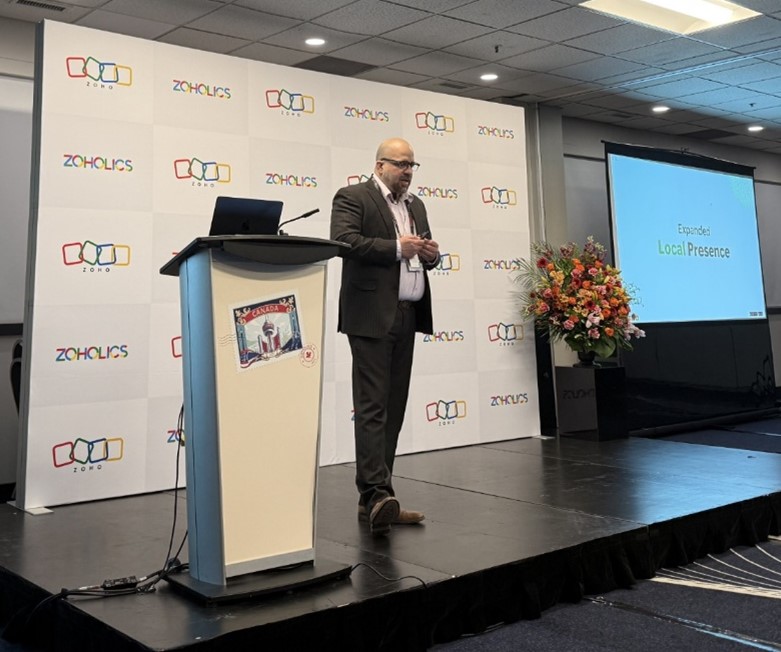Zoholics Canada 2025 Showcases Zoho One Evolution and Local Market Focus
(Toronto, ON) November 18, 2025 – At Zoholics Canada 2025, Zoho reviewed recent updates to Zoho One while also introducing new products tailored for the Canadian market. The event highlighted Zoho’s dual strategy: advancing its unified business operating system and deepening regional and segment-specific coverage.
As Zoho’s flagship suite, Zoho One has undergone a significant redesign focused on improving integration and user experience. A common Zoho customer request has been for stronger interoperability across Zoho’s 50+ business applications; the average Zoho customer uses 22 of its applications. Zoho One now offers a unified workspace experience for all Zoho applications, positioning the platform as a central business operating system that spans the entire organization’s workflows.
Enabling the unified experience is Spaces, a contextual workspace model that organizes widgets and tools by user intent, alongside an Action Panel and Approvals that centralize workflows and tasks across the suite. Boards now provides consolidated access to operational data from Zoho and third-party systems, while a unified customer portal enables organizations to merge multiple customer-facing interfaces into a single authenticated view.
AI has also been expanded through Zia, Zoho’s intelligent assistant, now embedded across applications with Zia Hubs for unified knowledge management. The new Vani workspace additionally provides a visual collaboration layer for planning and brainstorming.
Separately, Zoho expanded its Canadian offering with several localized and segment-focused products:
- Zoho Payroll for Canada, addressing local compliance and payroll processing.
- Zoho Point of Sale for Canada, designed for retail and in-person commerce.
- Zoho Solo, a new platform designed for solopreneurs and independent professionals. Features include management for tasks, contacts, income, expense, and tax.

Managing Director Chandrashekar Lalapet Srinivas Prasanna (LSP) delivering Zoholics Canada’s opening announcements. Source: Thomas Randall
Our Take
Zoholics Canada 2025 reinforced Zoho’s deep commitment to small and mid-sized organizations, even as the company increasingly moves into enterprise markets. The event’s announcements and tone reflected Zoho’s enduring SMB orientation, emphasizing affordability, localization, and incremental platform growth. The launch of Zoho Solo, alongside new domestic payroll and retail capabilities for Canada, reflects the company’s intent to embed itself deeper into the operational fabric of Canadian SMBs, specifically. This focus is supported by Zoho’s heightened visibility in Toronto (advertising prominently across Pearson Airport, Union Station, and the Gardiner Expressway) and its clear message around data sovereignty, a key concern for Canadian organizations.
However, beneath this SMB-centric positioning lies a company eager to prove it can scale to enterprise demands. The overhaul of Zoho One into a unified, workflow-driven experience represents a significant architectural shift for the platform, transforming a historically sprawling catalogue of applications into a cohesive workspace where user intent guides interaction. Zoho’s decision to develop its own large language model further reinforces its long-standing philosophy of technical self-sufficiency and customer data ownership, ensuring that AI innovation does not compromise privacy or compliance. Reference customers such as TELUS provide evidence that Zoho’s platform meets the complexity and governance expectations of larger organizations.
This duality between SMB focus and enterprise aspiration is a point of interest in Zoho’s trajectory. The company’s go-to-market strategy continues to favor organic growth, encouraging smaller organizations to expand their use of Zoho products over time. Yet Info-Tech observes that mid- to large-sized enterprises are beginning to shortlist Zoho, particularly for CRM – especially where Zoho’s investments in data infrastructure ownership, deployment flexibility, and platform unification simplify many of the operational hurdles associated with incumbent systems.
For CIOs and IT leaders, Zoho’s evolution signals a widening of its addressable market. Zoho remains most relevant for small and midmarket organizations seeking affordable, integrated business applications; however, the combination of unified experience, AI enablement, and sovereign infrastructure positions Zoho One as a credible, lower-cost alternative for larger enterprises seeking greater control and operational simplicity across their business systems.